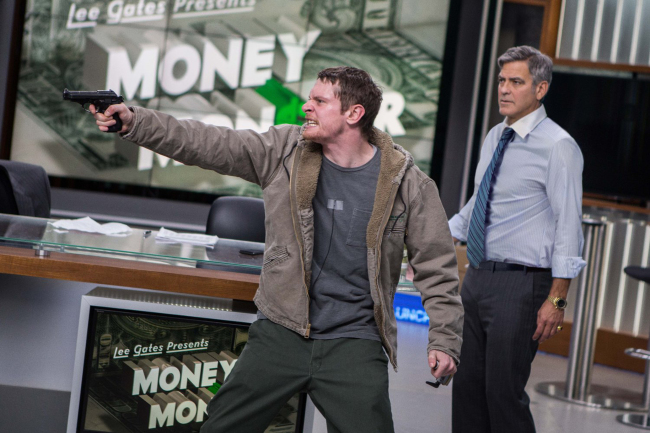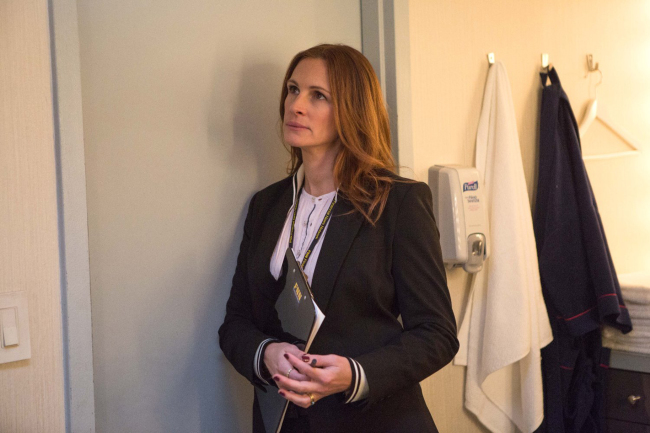Lee Gates, the main man in the complex thriller “Money Monster,” plays a popular stock specialist on live television, telling viewers what to buy, sell or hold. He looks and acts like the classic stereotype of a Wall Street whiz on TV -- $5,000 suit, winning smile, sharp patter.
Lee, played by the handsome and genial George Clooney, is big on TV because even when his proposals are risky, they sound brilliant. If he warns that your retirement savings will tank unless you stockpile Nigerian hedge funds, his polished presentation could convince you. Provided he stays in character. And you don’t know Treasury bonds from bail bonds.
Lee, played by the handsome and genial George Clooney, is big on TV because even when his proposals are risky, they sound brilliant. If he warns that your retirement savings will tank unless you stockpile Nigerian hedge funds, his polished presentation could convince you. Provided he stays in character. And you don’t know Treasury bonds from bail bonds.

Remorselessly vain Lee is like the friendliest gaming table croupier you’ll ever meet. When one of the biggest bets he is pushing crashes, a furious young investor bursts onto his show with a gun and explosive vest, and overinflated Lee finds himself to be, sadly, a mere mortal. Police-o-rama raids, hostage negotiations, gripping action sequences and high ratings for Lee’s broadcast ensue as his life falls apart.
“Money Monster,” the fourth feature directed by Jodie Foster, resembles Lee. It’s fairly smart and has fetching features. But it’s only kind of good.
At the plot level, it’s sometimes murky when you want it to snap into plausibility. While it often feels like Foster’s instincts as a director outpace the abilities of her screenwriting team, what she delivers is infernally attractive.
The film is a sort of crime-thriller and a kind of critique of malfeasance by Wall Street’s masters of the universe. But mainly, it’s a portrait of a man whose life is quickly turned upside down, inside out and nearly shot full of holes. Clooney is great as a narcissist with multiple divorces and a messy emotional life being publicly dragged through the whole nine yards. When he begins connecting with the blue-collar guy holding him prisoner (Jack O’Connell), is Lee’s increasing decency another act for the camera?
Clooney’s shifting approach to this antihero part is so different in terms of energy that when he steps away from his glib broadcast role, it’s a relief. O’Connell, playing an unruly one-man riot, is asked to do little more than brandish weapons and shout threats, which he does with chaotic energy.
Julia Roberts adds a grace note to the story as Lee’s producer, remaining in the control room and trying to handle the crisis. Stage managing her anxious star performer through the lifeline of his earphone, she guides him into conversations with the terrorist that prevent the siege from literally exploding. Keeping circumstances on the edge of total collapse with good advice, she is genuine and at times wrenching. She also has the nearest thing to an emotional connection to the main character, talking him out of the slick persona he peddles on camera and back to real humanity.

Foster has made a long, excellent acting/producing/directing career out of working with gifted people on excellent films and recent TV fare like “House of Cards” and “Orange Is the New Black.” She takes a surprising step here, and doesn’t stumble. She carries the story across multiple hairpin turns as accusations of dishonesty trigger investigations into stock manipulation, high-tech detective work, and the appearance of a billionaire tycoon with an agenda of his own.
The movie transmutes from high stakes suspense to the human comedy while it hops from Manhattan to Korea, South Africa and Iceland. That’s a lot of shifting to do, and Foster manages it without stripping the gears.
By Colin Covert
Star Tribune (Minneapolis)
(TNS)


![[Exclusive] Korean military set to ban iPhones over 'security' concerns](http://res.heraldm.com/phpwas/restmb_idxmake.php?idx=644&simg=/content/image/2024/04/23/20240423050599_0.jpg&u=20240423183955)




![[Pressure points] Leggings in public: Fashion statement or social faux pas?](http://res.heraldm.com/phpwas/restmb_idxmake.php?idx=644&simg=/content/image/2024/04/23/20240423050669_0.jpg&u=)

![[Herald Interview] 'Amid aging population, Korea to invite more young professionals from overseas'](http://res.heraldm.com/phpwas/restmb_idxmake.php?idx=644&simg=/content/image/2024/04/24/20240424050844_0.jpg&u=20240424200058)








